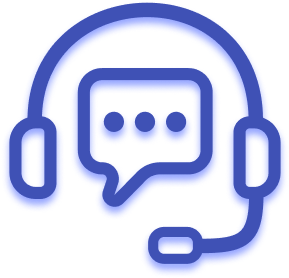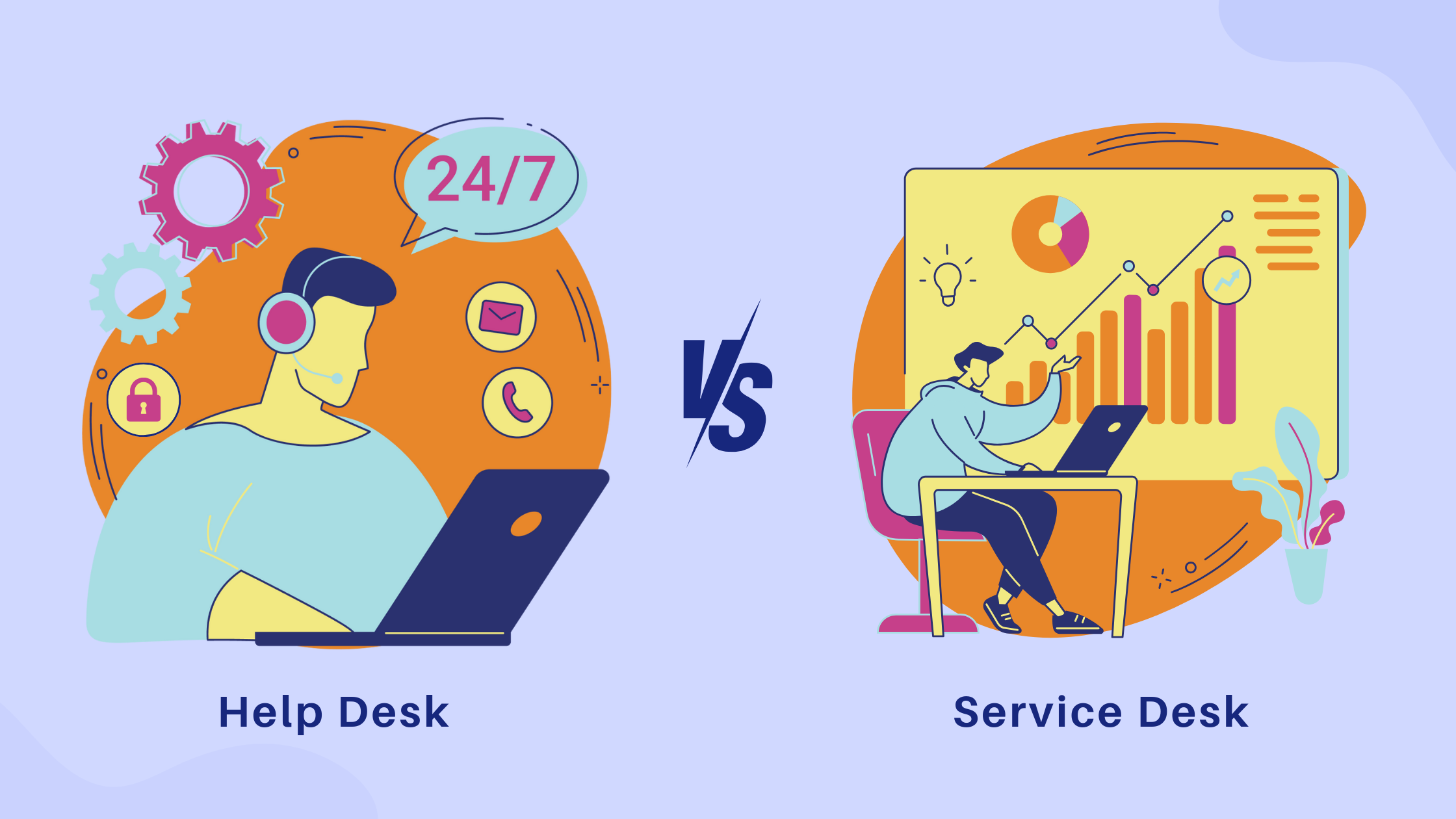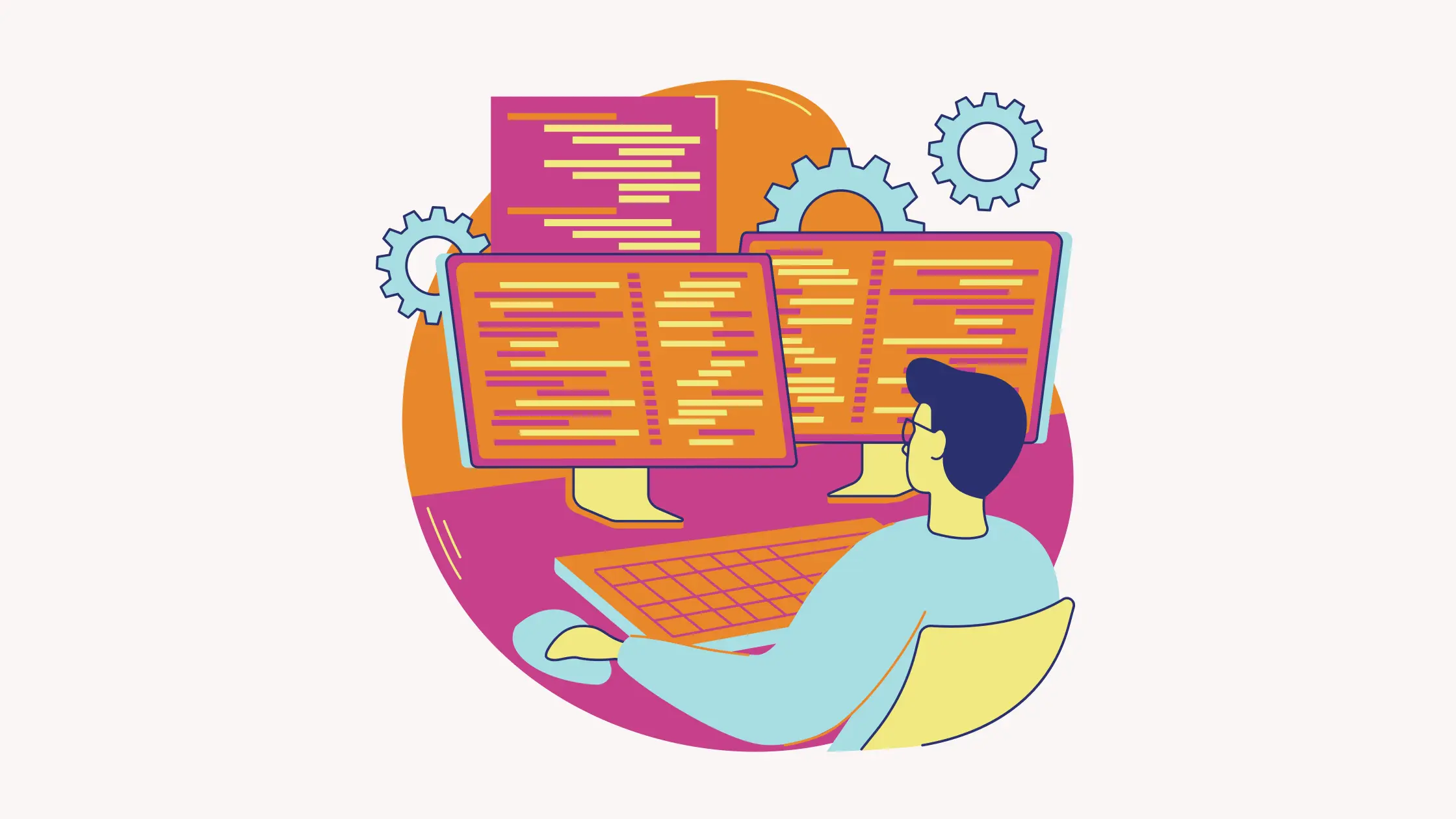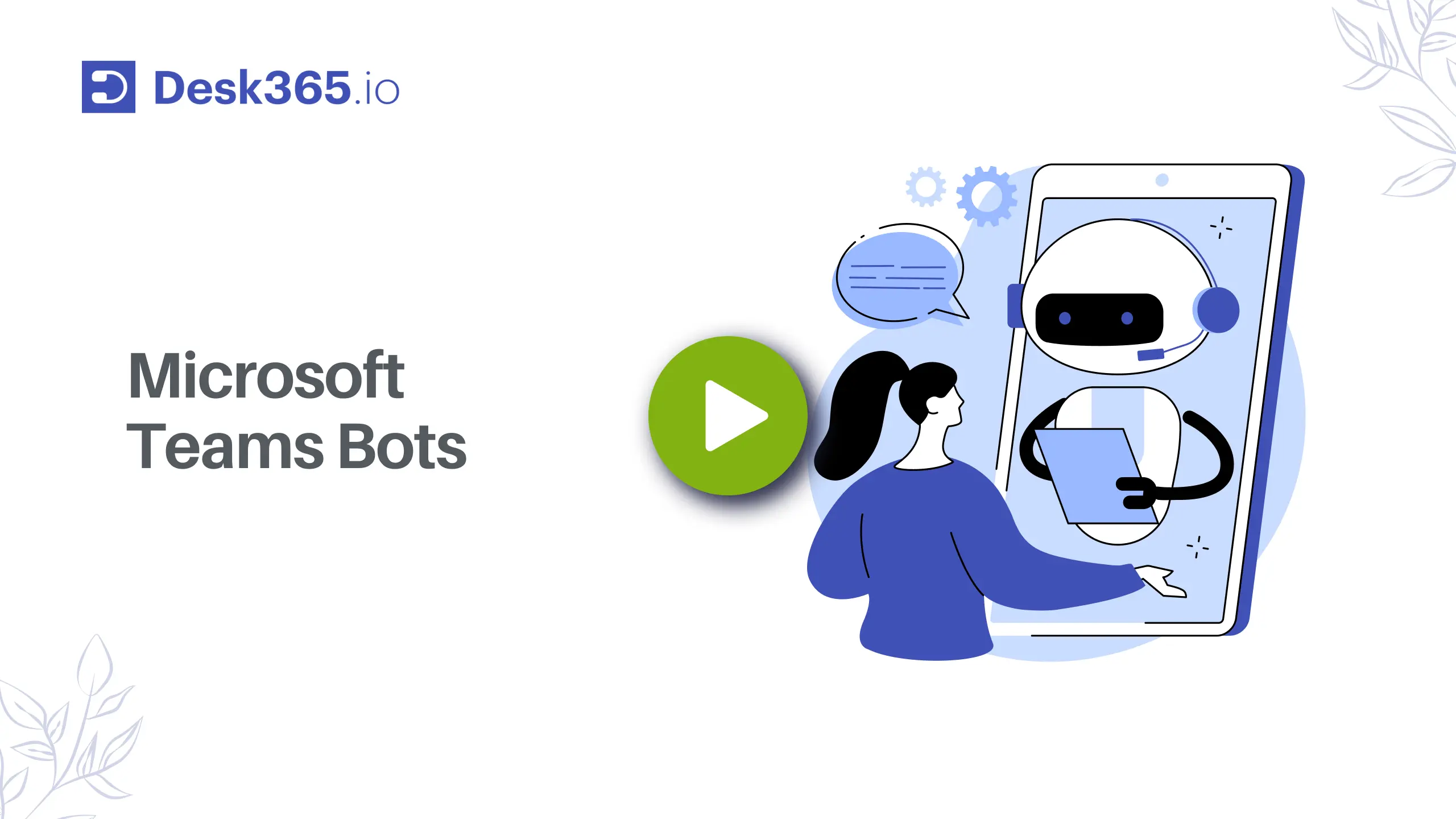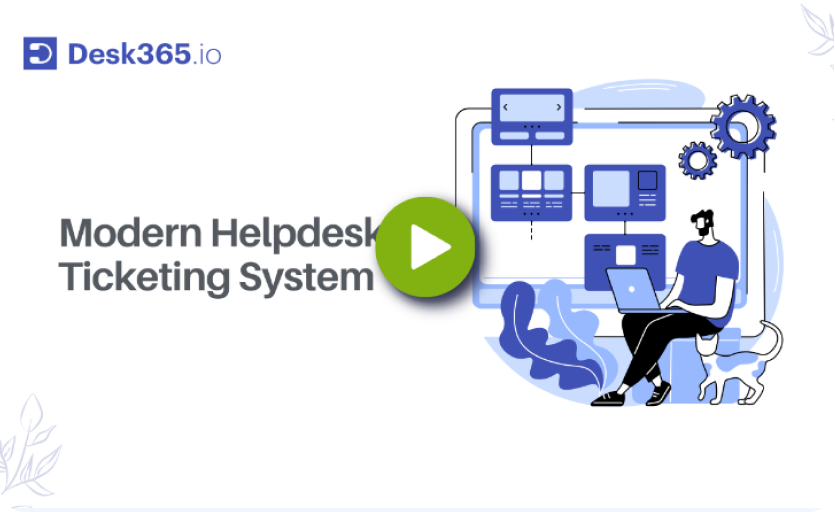60% of consumers say that quick resolution times are critical to their experience with a company. This stat shows that speed is key when it comes to customer service. While many businesses start managing customer inquiries through Google Forms, Excel sheets, or even SharePoint, these solutions can quickly become limiting as the volume of requests grows. That’s where a dedicated helpdesk ticketing system shines.
Unlike spreadsheets or simple forms, helpdesk systems are designed to streamline support. They allow teams to categorize, prioritize, and track each request easily, ensuring that no issue gets lost or delayed. Plus, with features like automatic ticket assignment, reminders, and reporting, helpdesk systems make it easy to stay on top of customer inquiries.
So, why do you need a helpdesk ticketing system? In this article, we’ll explore the essential reasons, look at different tools and types of helpdesk solutions, and break down everything you need to know to elevate your customer support.
What is a helpdesk ticketing system and how does it work?
Did you know that 60% of customers say fast response times are the most important part of their experience with a company? That’s why having a solid ticketing system isn’t just a nice to have—it’s a game changer for handling customer support seamlessly.
At its core, a ticketing system takes each customer inquiry and turns it into a ‘ticket,’ a neat package that captures all the details. Whether customers reach out via phone, email, chat, or social media, everything lands in one unified dashboard. This means no missed messages, and no scattered conversations—just organized, trackable requests that are easy to manage and prioritize.
Plus, if you’re wondering about the difference between a helpdesk and a service desk, think of it like this: a helpdesk focuses on resolving customer questions, while a service desk goes a bit broader, covering IT services that support company operations.
In short, a ticketing system like Desk365 does more than manage inquiries—it keeps things running smoothly, helping businesses deliver fast, personal service that keeps customers happy. Let’s explore the why, the how, and the types of ticketing systems to see which one might be the perfect fit for you.
Why does your organization need a helpdesk ticketing system?
Well, it all comes down to providing great customer service—quick, organized, and personal. Customers want fast responses, but as inquiries pile up, keeping up without the right tools can get overwhelming. That’s where a ticketing system changes the game.
With a ticketing system, every question or issue a customer raises is turned into a support ticket, capturing all the details in one place. This means no digging through emails or searching across channels; everything is right there on a single dashboard. Whether customers reach out by phone, email, or chat, each interaction is tracked and organized, so nothing gets missed.
One of the real perks? Ticket routing. The system can automatically direct each ticket to the right team or agent, so customers get quick, personalized help without the back-and-forth.
A great ticketing system also enables better personalized service. By storing conversation history and customer details, your team can pick up right where they left off, adding that extra layer of care that customers appreciate. And when it comes down to it, that’s what great customer service is all about making customers feel heard and valued.
In the end, a ticketing management system does more than just organize requests—it builds a smoother, more responsive experience that keeps customers happy and teams on track. So if you’re looking to boost customer satisfaction and make life easier for your support team, a ticketing system is a no-brainer
How does an IT ticketing system work?
Imagine a central hub for all your IT support needs. IT ticketing systems act as this hub, transforming user issues from various sources (email, phone calls, etc.) into organized “tickets.” These tickets track the entire resolution process, recording all interactions with the user and internal staff discussions.
But ticketing systems offer more than just tracking. They allow categorizing tickets as questions, problems, incidents, or tasks. This helps organize related issues. For example, a single email server outage can trigger multiple incident tickets that can all be linked to the main “problem” ticket. Once the core issue is resolved, the system can automatically update the status of all linked incidents.
The value doesn’t end there. When tickets are closed, they become a treasure trove of data. IT ticketing systems can analyze this data to generate reports and performance metrics, providing valuable insights into both IT support effectiveness and user needs.
What are the key features of a helpdesk ticketing system?
The key features of ticket management software are designed to help organizations manage customer support requests efficiently and effectively. Here are some of the main features:
1. Ticket creation and management
Desk365’s Ticket Creation and Management feature is designed to make customer support seamless. Every customer inquiry—whether through email, chat, Microsoft Teams, or web widgets —becomes a ticket, capturing all essential details so nothing is overlooked. This automated system prioritizes and assigns tickets to the right agents, ensuring that issues are handled quickly and effectively.
2. Automated ticket routing
Desk365’s Automated Ticket Routing feature eliminates guesswork when assigning tickets by automatically directing each inquiry to the most suitable agent or team. This means customer issues reach the right people immediately, cutting down on wait times and back-and-forth transfers.
3. Prioritization
Enables support teams to prioritize tickets based on urgency, impact, or other factors, ensuring that the most critical issues are addressed first.
4. Categorization and tagging
Helps organize tickets into categories or tags for easier sorting and analysis. This can also aid in identifying common issues or trends.
5. Communication tools
Provides a platform for communication between customers and support agents directly within the ticket. This can include email integration, chat features, and the ability to attach files or screenshots.
6. Knowledge base integration
Desk365’s Knowledge Base Integration allows customers and support agents to access a wealth of helpful resources directly within the ticketing system. This feature makes common questions or troubleshooting steps readily available, enabling customers to find answers independently through self-service options and helping agents resolve issues faster with quick reference guides.
7. Reporting and analytics
Desk365’s reporting and analytics offer tools to generate reports and analyze data related to ticket volume, resolution times, agent performance, and customer satisfaction.
8. Customization and scalability
Desk365’s Customization feature ensures that your helpdesk grows and adapts alongside your business. With flexible options to customize workflows, ticket fields, and branding, Desk365 allows you to shape the platform to fit your unique support needs. Whether you’re handling a high volume of tickets, adding new support channels, or personalizing the customer experience, Desk365 scales effortlessly to keep up with your evolving requirements.
10. Integration with other tools
This can be integrated with other business systems, such as CRM software, to provide a more comprehensive view of customer interactions and history.
These features collectively help organizations deliver timely and effective customer support, improve the efficiency of their support teams, and gain insights into their support operations.
Ticket Management
- Custom Ticket Views
- Customer Management
- Responsive Mobile Web Apps
- Multiple Emails
- Multiple Groups/Departments
- Draft with AI
- Collision Detection
- Time Tracking
- 'Watchers' of Tickets
Workflow Automation
- Automation Rules
- Automated Ticket Assignment
- SLA Management & Business Hours
- SLA Reminders & Escalations
- Multiple SLAs
- SLAs in Automations
- Canned Responses
- Tasks/To-do Lists
- Closure Rules
Customization
- Custom Domain
- Custom Email Servers
- Custom Ticket Fields
- Custom Forms
- Custom Roles
- Custom Reports & Graphs
- Custom Response Templates
- Custom Knowledge Base
Integrations
- Entra ID Single Sign-on
- API Access
- Web-hooks
- Power Automate Connector
- Microsoft 365 Copilot Plugin
Omni-Channel
- Microsoft Teams Ticketing
- Email Ticketing
- Customer Support Portal
- Web Form/Web Widget
- Unified Inbox
Data & Analytics
- Customer Surveys & Reports
- Ticket Trend Reports
- Productivity/SLA Reports
- Import / Export Data
Support
- Free Setup and Installation
- Priority Support
We also offer a Free Plan with a limited set of features for hobby projects and testing purposes. Limited to 3 agents and 50 tickets per month.
What are the benefits of the helpdesk ticketing system?
1. Enhanced organization
By centralizing all customer inquiries into a single system, ticketing systems help keep everything organized and easily accessible. This reduces the chances of missing or overlooking requests.
2. Improved efficiency
Automated features like ticket routing and prioritization help ensure that issues are addressed promptly and by the right team members. This can lead to faster resolution times and more efficient use of resources.
3. Better tracking and accountability
With a ticketing system, every interaction and step taken to resolve an issue is recorded. This provides a clear audit trail and helps hold support agents accountable for their responses.
4. Increased customer satisfaction
Quick and effective resolution of support tickets leads to happier customers. In fact, according to a Zendesk study, 92% of customers feel satisfied when they receive a quick resolution to their support inquiries.
5. Data-driven insights
Ticketing systems provide valuable data that can be analyzed to identify trends, measure performance, and make informed decisions. For example, understanding common issues can help organizations proactively address them.
6. Cost savings
By streamlining support processes and improving efficiency, ticketing systems can lead to cost savings for organizations.
Best practices for helpdesk ticketing system
Implementing best practices for IT ticketing software is essential for optimizing your support workflow and enhancing the overall customer experience. Here are some key best practices to consider:
- Define clear ticketing processes
- Prioritize tickets effectively
- Automate routine tasks
- Encourage self-service
- Maintain clear communication
- Collect and analyze feedback
- Train your support team
- Integrate with other tools
- Monitor performance metrics
Overview of the top 17 best helpdesk ticketing systems for 2025
Here is the list of the top 17 best helpdesk ticketing systems,
- Desk365
- Help Scout
- Freshdesk
- JitBit
- Zendesk
- AzureDesk
- HubSpot Service Hub
- Zoho Desk
- Kayako
- LiveAgent
- Hiver
- Front
- HappyFox
- TeamSupport
- Spiceworks
- Groove
- Helpwise
Comparison chart of the top helpdesk ticketing system
Our top helpdesk ticketing system comparison chart highlights the best options with features for efficient customer service management, helping you choose the right one for your business needs.

Software
Price
Free trial
Key Features
Desk365
Feature starting at $12 /agent/month
21 days
- Shared Inbox
- Ticket Tracking and Escalation
- Collaborating on Tickets
- Automation Capabilities
- Collision Detection
- Reporting and Analytics
- CSAT Surveys
- Email Templates
- Knowledge Base Integration
- SLA Management
Help Scout
Starts at $20 - $65 /agent/month
14 days
- Ticketing
- Live chat
- Knowledge base
- Call center
- SLAs (Service Level Agreements)
- Reporting
- Automation
Freshdesk
Starts at $15- $65 /user/month
21 days
- Ticketing
- Live chat
- Knowledge base
- Call center
- SLAs (Service Level Agreements)
- Reporting
- Automation
JitBit
Starts at $29 - $249 /agent/month
14 days
- Ticketing
- Live chat
- Knowledge base
- Call center
- SLAs (Service Level Agreements)
- Reporting
- Automation
Zendesk
Pricing scales from $55 to $115/agent/month
14 days
- Ticketing
- Live chat
- Knowledge base
- Call center
- SLAs (Service Level Agreements)
- Reporting
- Automation
AzureDesk
Starts at $50 /agent /month
14 days
- Automation Capabilities
- Reporting and Analytics
- Live chat
- Ticketing
- Social Media integration
- Knowledge Base Integration
- SLA Management
HubSpot Service Hub
Starts at $18 - $1200 /agent/month
unavailable
- Ticketing
- Live chat
- Knowledge base
- Call center
- SLAs (Service Level Agreements)
- Reporting
- Automation
Zoho Desk
Starts at $20/agent/month
15 days
- Ticketing
- Live chat
- Knowledge base
- Call center
- SLAs (Service Level Agreements)
- Reporting
- Automation
Kayako
Starts at $15 /agent /month
14 days
- Multi-Channel Support
- Unified Customer View
- Advanced Ticketing System
- Real-Time Chat
- Knowledge Base Integration
- SLA Management
LiveAgent
All features for just $9 - 69 /agent /month
14 days
- Automation Capabilities
- Reporting and Analytics
- Live chat
- Ticketing
- Social Media integration
- Knowledge Base Integration
- SLA Management
Hiver
Starts at $10 - $40 /user/month
14 days
- Multi-channel Engagement tooltip
- Email Management tooltip
- Team Collaboration tooltip
- Usage Limits tooltip
- iOS & Android Mobile Apps
- Onboarding Support
- 24x7 Chat & Email Support
Front
Starts at $59 - 229 /user/month
7 days
- Ticketing
- Live chat
- Knowledge base
- Call center
- SLAs (Service Level Agreements)
- Reporting
- Automation
HappyFox
Starts at $20 extending to $65/agent/month
14 days
- Ticketing
- Live chat
- Knowledge base
- Call center
- SLAs (Service Level Agreements)
- Reporting
- Automation
TeamSupport
Starts at $49/user/month
14 days
- Ticketing
- Live chat
- Knowledge base
- Call center
- SLAs (Service Level Agreements)
- Reporting
- Automation
Spiceworks
Completely free to use
NA
- Ticketing
- Live chat
- Knowledge base
- Call center
- SLAs (Service Level Agreements)
- Reporting
- Automation
Groove
Starts at $12/agent/month
7 days
- Ticketing
- Live chat
- Knowledge base
- Call center
- SLAs (Service Level Agreements)
- Reporting
- Automation
Helpwise
Starts at $12/agent/month
7 days
- Ticketing
- Live chat
- Knowledge base
- Call center
- SLAs (Service Level Agreements)
- Reporting
- Automation
1. Desk365
Desk365 provides a powerful cloud-based ticketing system that is user-friendly and easy to implement. It is designed to boost your team’s efficiency and productivity by handling service desk incidents and requests seamlessly. It provides a robust ticketing system that automates ticket creation and updates, enhancing workflow and reducing manual efforts.
Unified inbox
Desk365’s unified inbox consolidates all customer communications from various channels into a single platform, allowing multiple agents to efficiently manage and respond to inquiries. This centralization ensures that no customer issue goes unnoticed, facilitates better teamwork, and promotes a cohesive approach to customer service.
Omnichannel support
Desk365 supports seamless integration across multiple communication channels, including email, and Microsoft Teams. This ensures that customers can always reach out through their preferred medium, enhancing the accessibility and responsiveness of your support team.
Ticket categorization and prioritization
Desk365 allows you to categorize tickets based on the nature of the enquiry or the product/service involved. This helps support teams to prioritize and allocate resources accordingly. By assigning different levels of priority, urgent issues can be addressed promptly, preventing any potential escalations. This helps to ensure that customer enquiries are handled in the most appropriate manner.
Customization
Desk365 allows customization of the helpdesk to align with your company’s branding. You can modify the look and feel of the platform, including logos, themes, and colors, to maintain brand consistency across your customer service touchpoints.
Collaborating on tickets
Collaboration is an important aspect of Desk365. It allows team members to work together on customer issues, discuss the issue using private notes and comments, and provide feedback. This helps to ensure that all team members are on the same page and that customer conversations are handled efficiently and effectively. This promotes knowledge sharing and enhances problem-solving capabilities.
Automation capabilities
Desk365’s automation feature allows teams to automate repetitive tasks such as assigning tickets, sending notifications, setting SLAs, and more. With helpdesk automation, teams can streamline their workflows, reduce manual effort, and ensure that customer support processes run smoothly and effectively.
Reporting and analytics
Desk365 offers reporting and analytics features that allow teams to track helpdesk metrics like response and resolution times, as well as customer satisfaction. This data helps identify areas for improvement and ensures efficient handling of customer inquiries. Managers can analyze ticket trends and satisfaction metrics to optimize support workflows and make data-driven decisions to enhance customer satisfaction
CSAT surveys
Desk365’s CSAT surveys are a valuable feature that allows teams to gather feedback from customers and measure their satisfaction levels. This helps to identify areas for improvement and ensure that customer needs are being met. With Desk365, you can easily create and send CSAT surveys to customers and track their responses in real-time.
Knowledge base
Desk365’s knowledge base serves as a central repository where customers and agents can find detailed articles and guides. This resource is crucial for enabling self-service and equipping agents with the information they need to handle inquiries effectively.
Collision detection
Desk365’s collision detection feature alerts team members when multiple agents are working on the same ticket. This prevents duplication of effort and ensures that customer inquiries are handled efficiently. With this feature, team members can avoid overlapping work and collaborate effectively to resolve customer issues.
Hear Directly From Desk365 Customers
Performance, Support, Easy-to-use. The Performance is incredible – one of the fastest Helpdesk systems I have ever worked with. The Support is just amazing. Any inquiries will be answered quickly and professionally. Easy-to-use: almost no one, from our ~100 employees, needed any training. It’s self-explanatory.

Posted on
February 22, 2023
Pricing:
Lowest Paid Plan: $12/agent/month
Highest Paid Plan: $20/agent/month
Free trial available.
2. Help Scout
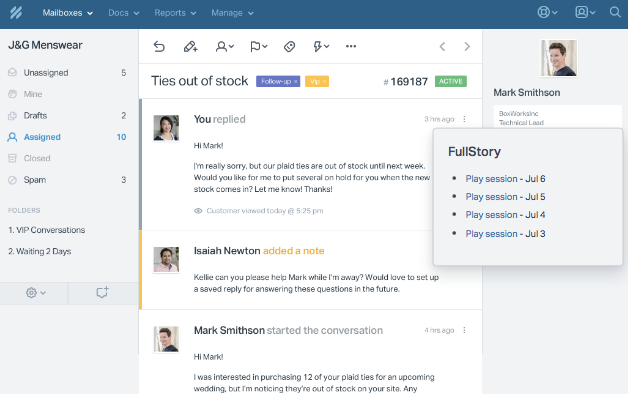
Help Scout, often compared with Zendesk is a customer service platform designed to streamline support processes and enhance customer interactions with features like shared inboxes, knowledge bases, and automated workflows. Known for its user-friendly interface and strong focus on customer satisfaction, Help Scout is a popular choice for businesses seeking efficient and personalized customer support solutions.
Key features of Help Scout
- Shared inboxes
- Knowledge Bases
- Automated workflows
- Reporting and Analytics
- Integrations with various apps
- Live chat
- Collaboration tools
Pricing
- Standard: $20/user/month
- Plus: $40/user/month
- Company: $65/user/month
3. Freshdesk
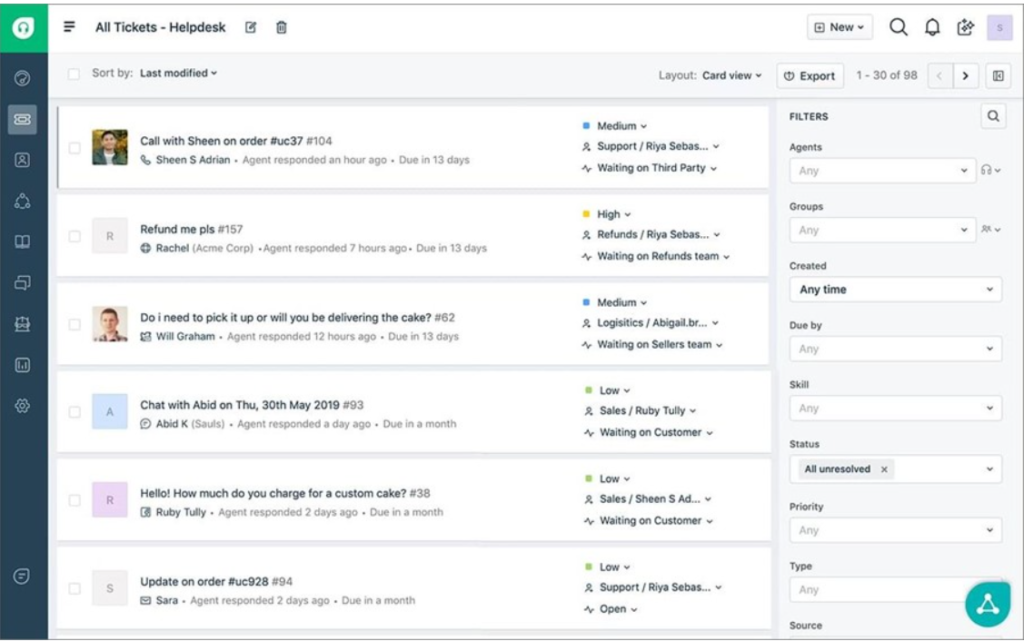
Freshdesk, often compared with Zendesk, is a comprehensive customer support software developed by Freshworks Inc. It’s designed to streamline customer service processes and improve the quality of support provided by businesses across various industries. Freshdesk offers a multitude of features aimed at enhancing customer experience and boosting the efficiency of support teams.
Recommended Reading – 13 Best Freshdesk Alternatives for Businesses for 2025
Key features of Freshdesk
- Ticket management
- Zia AI Assist
- Self-service
- Agent productivity
- Customization
Pricing
- Growth: $15/agent/month
- Pro: $49/agent/month
- Enterprise: $79/agent/month
4. JitBit
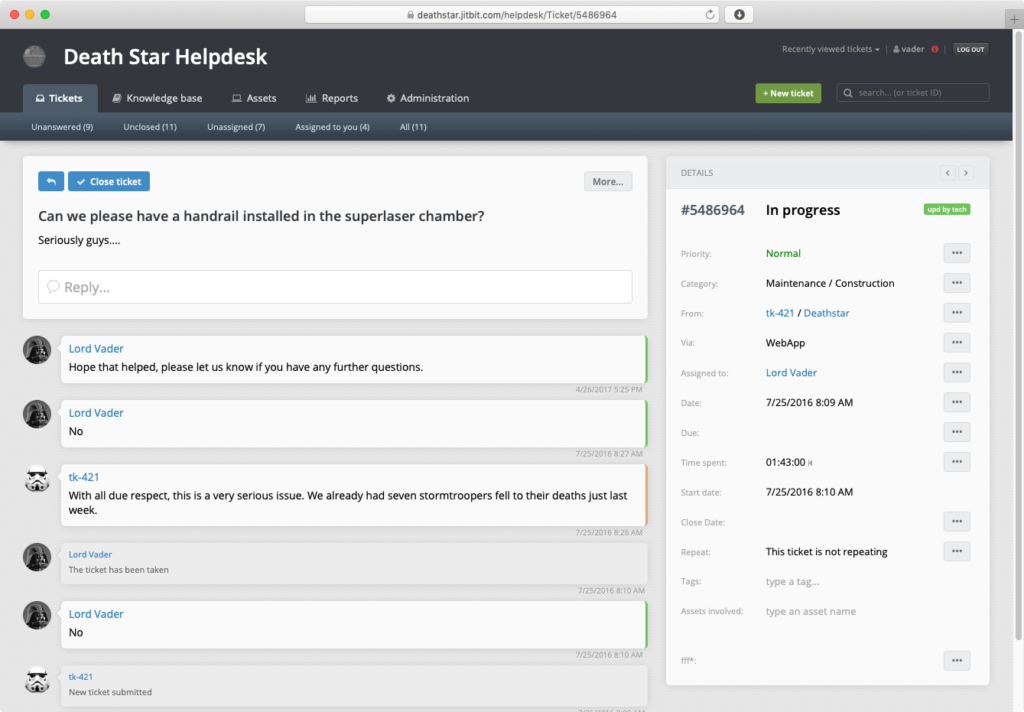
JitBit is a help desk ticketing system that offers a range of features to help you manage support requests efficiently. The system integrates with Microsoft Teams, allowing you to receive notifications about new tickets in your chosen Teams channel.
Key features of JitBit
- MS Teams integration
- Help Desk automation
- Team mailbox
- Canned responses and knowledge base
- IT service management
- Integration with 500+ applications.
Pricing:
Lowest plan – $24/agent/month
Highest plan – $208/agent/month
5. Zendesk
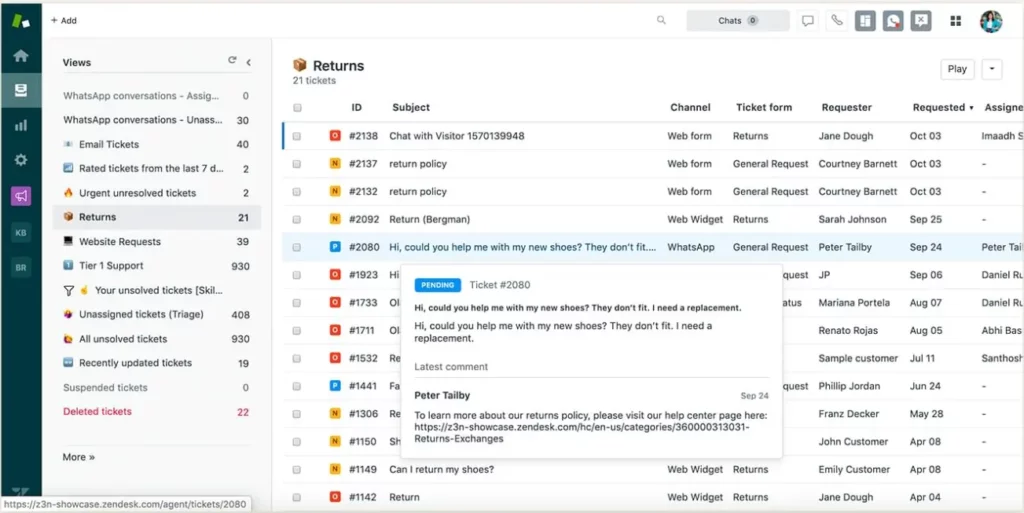
Zendesk, often compared with Freshdesk is a powerful customer service software that caters to businesses looking for a robust, scalable solution to manage their customer interactions. Known for its flexibility and comprehensive set of features, Zendesk allows companies to build better customer relationships through streamlined communication and improved support services. This platform stands out in the Zendesk review landscape as a top choice for businesses looking to elevate their customer experience with efficiency and customization.
Recommended Reading – Best Zendesk Alternatives in 2025
Key features of Zendesk
- Multi-Channel Support
- Advanced Ticketing System
- Automation and Workflows
- Customizable Interfaces
- Reporting and Analytics
- Integrations with Other Business Tools
- Knowledge Base and Self-Service Options
- Live Chat Capabilities
- AI and Machine Learning Enhancements
- Security and Compliance Measures
Read more – Zendesk Features [+Pros and Cons Breakdown]
Zendesk Pros and Cons
Pros:
- Multi-channel support for seamless customer communication.
- Advanced ticketing and automation for efficient workflows.
- Customizable interfaces and robust analytics.
- Integrations with popular business tools.
- AI-enhanced features and strong security.
Cons:
- Higher pricing, especially for advanced features.
- Steep learning curve and complex customization.
- Limited features in basic plans and occasional performance issues
Read More – Zendesk Reviews in 2025
Pricing
- Suite team: $55/agent/month
- Suite growth: $89/agent/month
- Suite professional: $115/month/ user
Read More – Zendesk Pricing: Does it offer value for money?
6. AzureDesk
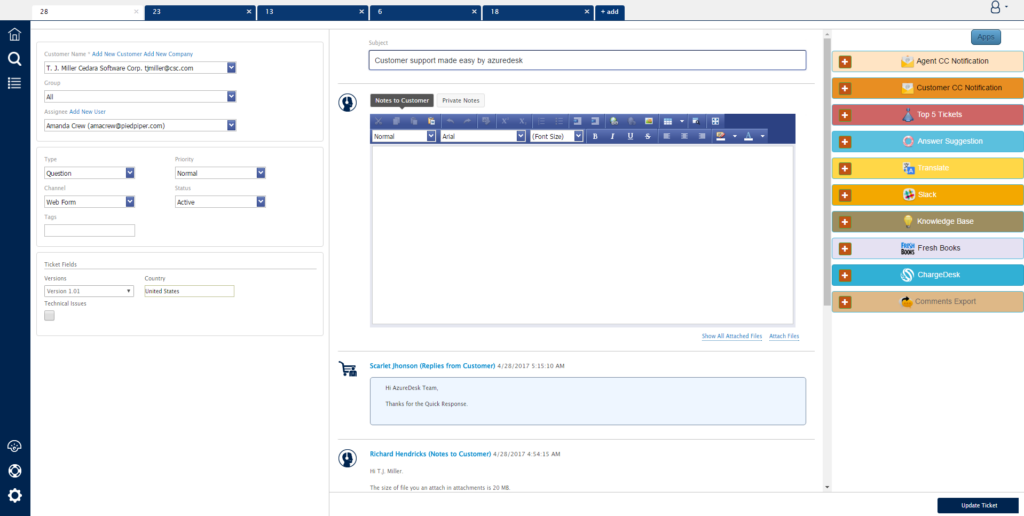
AzureDesk is a customer support software designed to help small to medium-sized businesses manage their customer service operations efficiently. It provides a suite of tools that enable businesses to deliver excellent customer support, streamline communication, and improve service delivery.
Key features of AzureDesk
- Ticketing system
- Multi-channel support
- Knowledge base
- Automation and workflows
- Reporting and analytics
- Integration capabilities
- Customizable interface
- Customer feedback system
Pricing
AzureDesk offers a Plus pricing plan at $33 per month, which includes ticket management, a self-service portal, and additional features.
7. HubSpot Service Hub
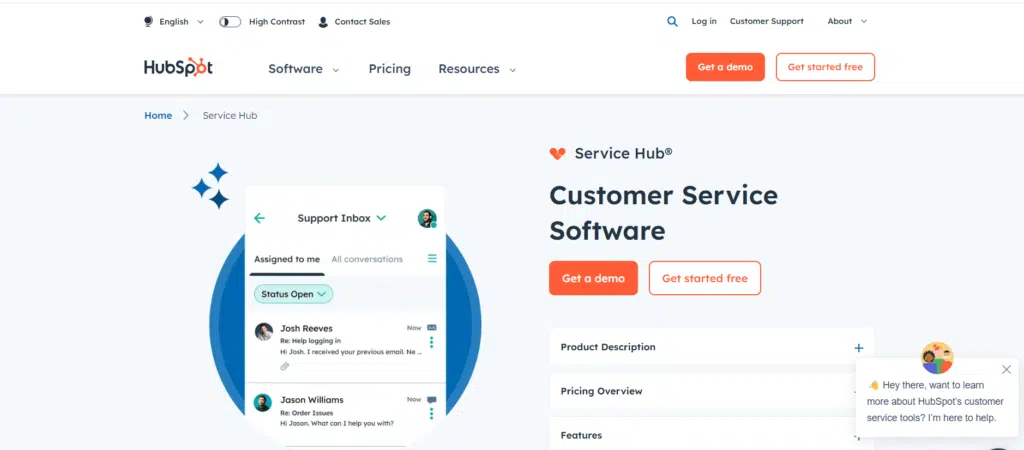
HubSpot’s Service Hub is an integrated customer service platform designed to streamline support processes and improve customer relationships. It provides businesses with a suite of tools to manage and connect with customers efficiently, offering a centralized system that integrates directly with HubSpot’s CRM. This allows for a seamless flow of information between marketing, sales, and customer service teams.
Key features of Hubspot Service Hub
- Ticket Automation
- Ticket Routing
- Ticket Status Tracking
- Email-to-Ticket Conversion
- SLA Management
- Knowledge Base Integration
- Reporting and Analytics
- Customer Feedback Surveys
HubSpot Service Hub Pricing
- Starter: $15/seat/month
- Professional: $450/3 seats/month
- Enterprise: $1,200/5 seats/month
8. Zoho Desk
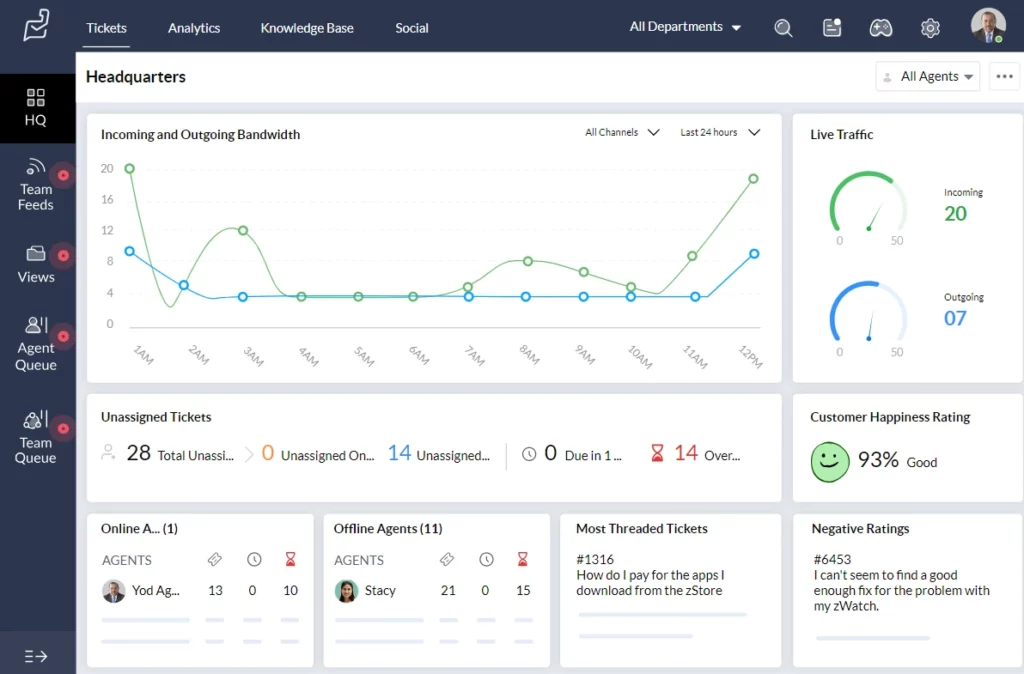
Zoho Desk, often compared with Zendesk is a cloud-based customer service software designed to help businesses manage their customer support activities efficiently. As a part of the Zoho ecosystem, which includes a wide range of business and productivity tools, Zoho Desk integrates seamlessly with other Zoho applications as well as third-party systems. Here’s what makes Zoho Desk stand out:
Recommended Reading – Best Zoho Desk Alternatives for Businesses in 2025
Key features of Zoho Desk
- Customization
- Ticket management
- Omnichannel
- Automation
- Analytics
Pricing
- Standard: $14/user/month
- Professional: $23/user/month
- Enterprise: $35/user/month
9. Kayako
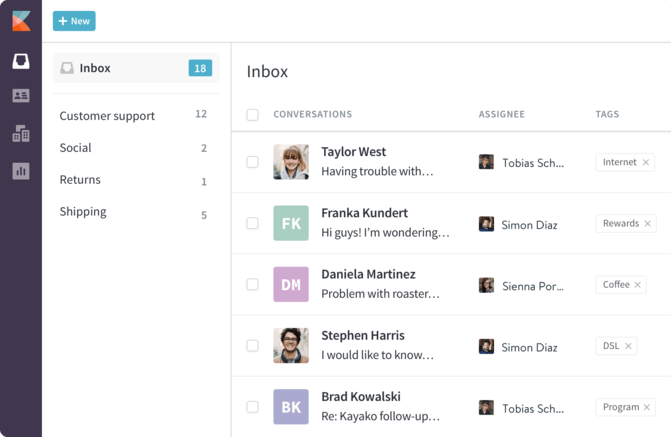
Kayako is a comprehensive customer support platform designed to help businesses provide exceptional customer service efficiently. It combines various support tools into a single application, enabling companies to manage customer interactions across multiple channels seamlessly.
Key features of Kayako
- Multi-channel support
- Unified customer view
- Live chat
- Self-service portal
- Ticketing system
- Automation and workflows
Pricing
- Starter: $19/user/month
- Growth: $59/user/month
- Scale: $99/user/month
- Premier: $229/user/month
10. LiveAgent
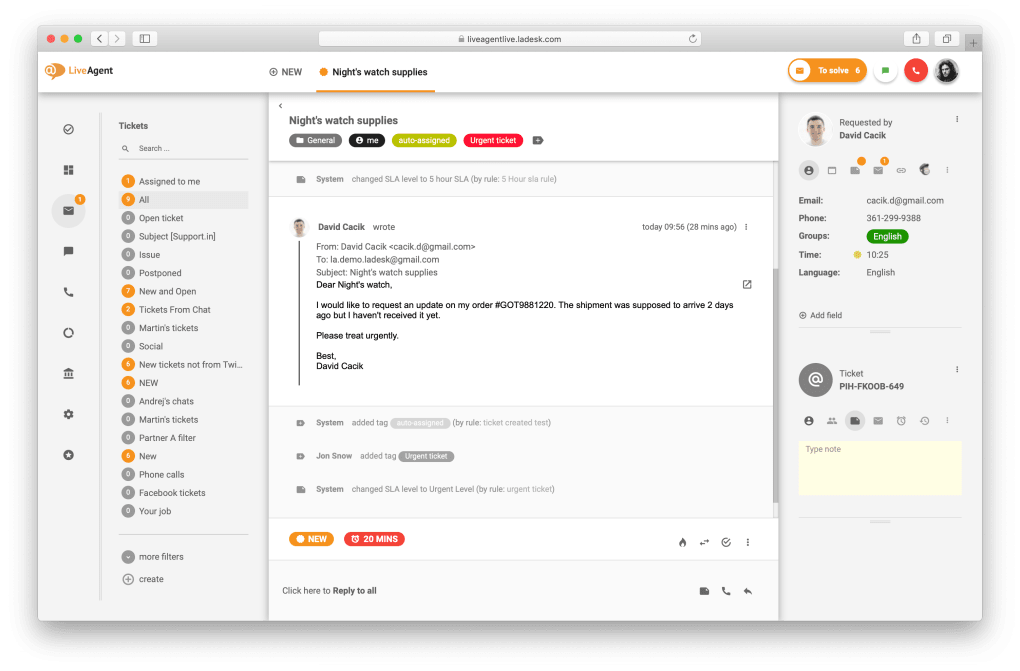
LiveAgent is a versatile customer support software that provides a comprehensive suite of tools for businesses to manage customer interactions across multiple channels.
It offers features such as ticketing, live chat, call center integration, and a knowledge base, all within a single platform. LiveAgent’s real-time chat and ticketing system enable support teams to respond quickly and efficiently to customer inquiries, while its robust reporting and analytics tools help track performance and identify areas for improvement.
Additionally, LiveAgent offers customization options and integration with various third-party applications, making it a flexible solution for businesses looking to enhance their customer support and engagement strategies.
Key features of LiveAgent
- Ticket management
- Live chat
- Real-time visitor monitoring
- Video chat
- Multi-channel support (email, social media, voice)
- Knowledge base
- Customer Portal
- Automation and rules
- SLA management
- Reporting and analytics
Pricing:
Free: Forever free plan
Ticket: $15/agent/month
Ticket + Chat: $29/agent/month
All-Inclusive: $39/agent/month
11. Hiver
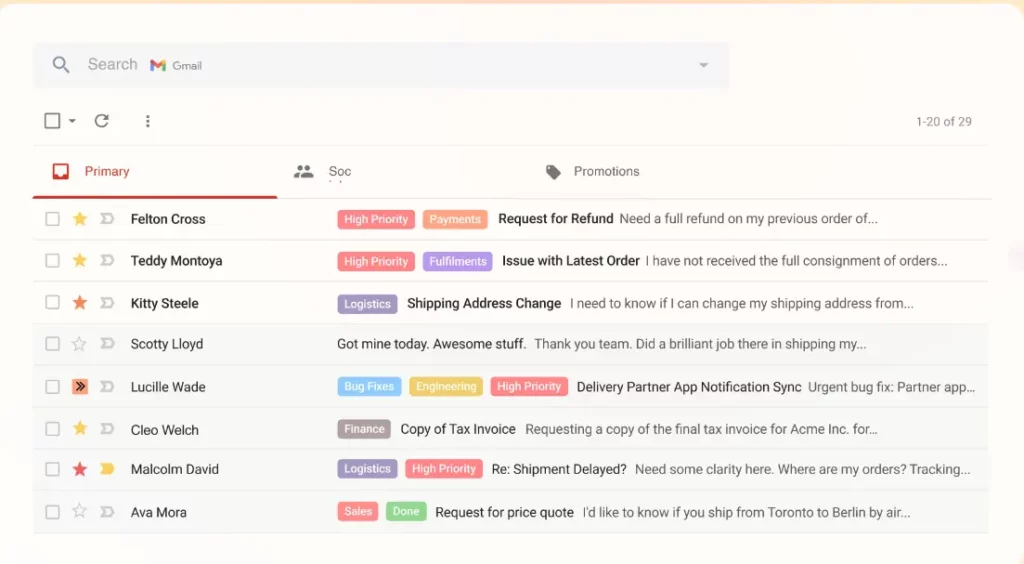
Hiver is a customer service solution that transforms Gmail into a powerful collaboration and customer support tool, particularly designed for teams that manage shared inboxes. It is ideally suited for small to medium-sized businesses and teams looking for an efficient way to handle customer communications without leaving the Gmail interface.
Key features of Hiver:
- Shared inboxes
- Email tags
- Collision alerts
- Email templates
- Automated workflows
- Customer satisfaction ratings
- Analytics and reports
- Round robin assignment
- Integration with other tools
Pricing
- Growth: $22/user/month
- Pro: $37/user/month
- Elite: $57/user/month
12. Front
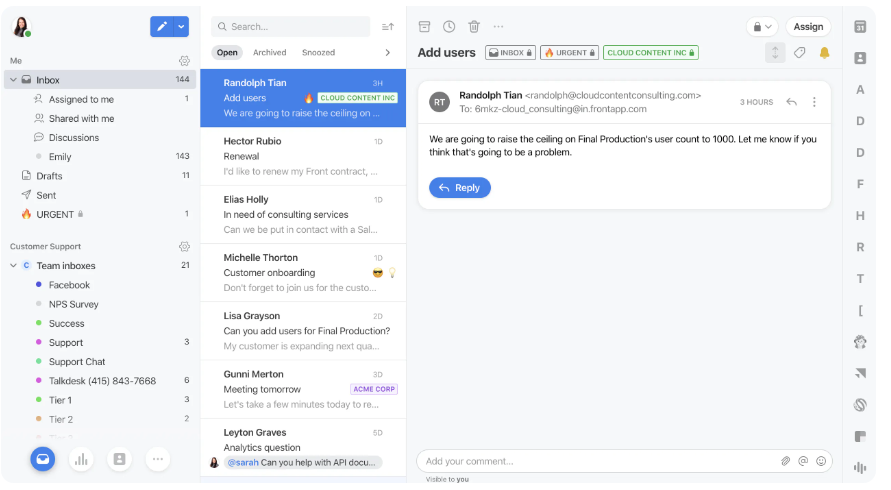
Front is a customer communication platform that centralizes your email, social media, and team collaboration into one unified inbox. It is designed to help teams work together more efficiently on customer communications and to provide better service.
Key features of TeamSupport
- Unified inbox
- Collaboration tools
- Automated workflows
- Analytics and Reporting
- Integrations
- Customization
- Mobile Accessibility
Pricing
- Starter: $19/user/month
- Growth: $59/user/month
- Scale: $99/user/month
- Premier: $229/user/month
13. HappyFox
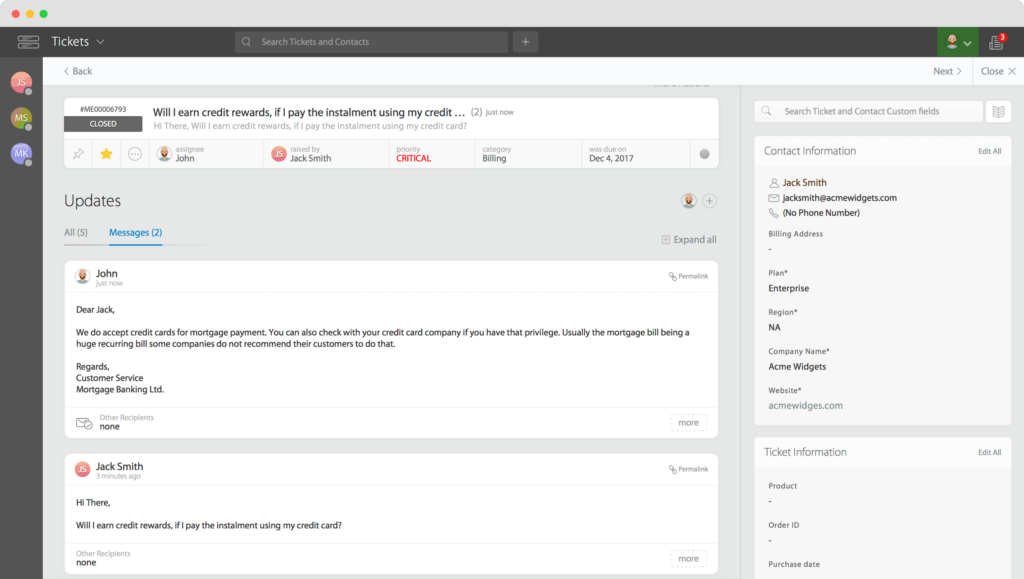
HappyFox is a robust and versatile ticketing system that integrates seamlessly with Microsoft Teams. Designed to enhance the efficiency of support and service teams, HappyFox offers a streamlined approach to managing customer support tickets directly within the Teams environment. This integration allows teams to maintain their workflow in Microsoft Teams while leveraging the powerful features of HappyFox for ticket management, ensuring a cohesive and productive user experience.
Features of HappyFox Teams Ticketing:
- Microsoft teams integration
- Automation tools
- Multi-channel support
- Customizable workflows
- Real-time collaboration
- Reporting and analytics
- Knowledge base integration
14. TeamSupport
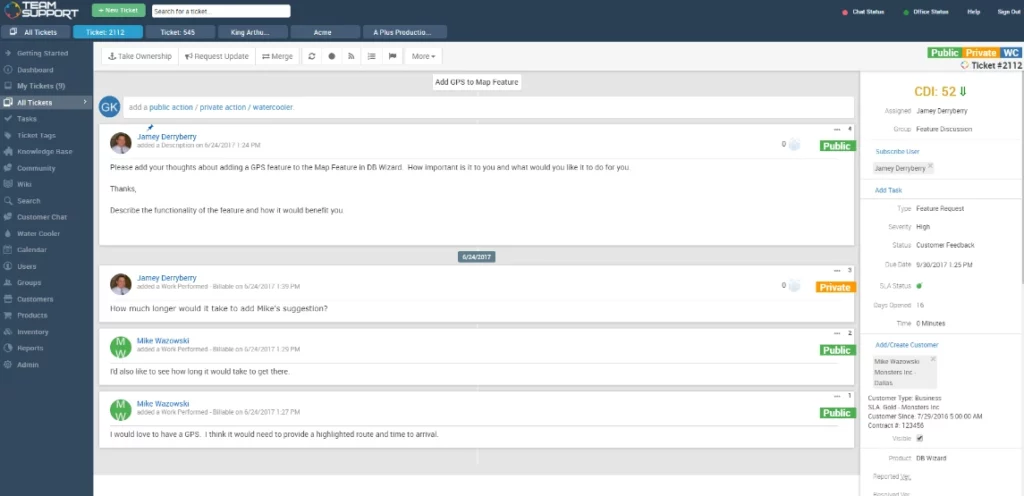
TeamSupport is a robust customer support software tailored specifically for B2B (business-to-business) companies, helping them manage and enhance their customer service operations. It is designed to streamline communication between businesses and their clients, ensuring efficient resolution of issues and fostering strong customer relationships.
Key Features of TeamSupport
- Ticket management
- Customer self-service portal
- Live chat
- Customer management
- Multi-channel support
- SLA management
- Advanced reporting & analytics
- Collaboration features
- Knowledge base management
Pricing
TeamSupport offers three pricing levels:
- Essential support – $49 per agent per month
- Enterprise support – $69 per agent per month
- Complete customer support suite – $119 per agent per month
15. Spiceworks
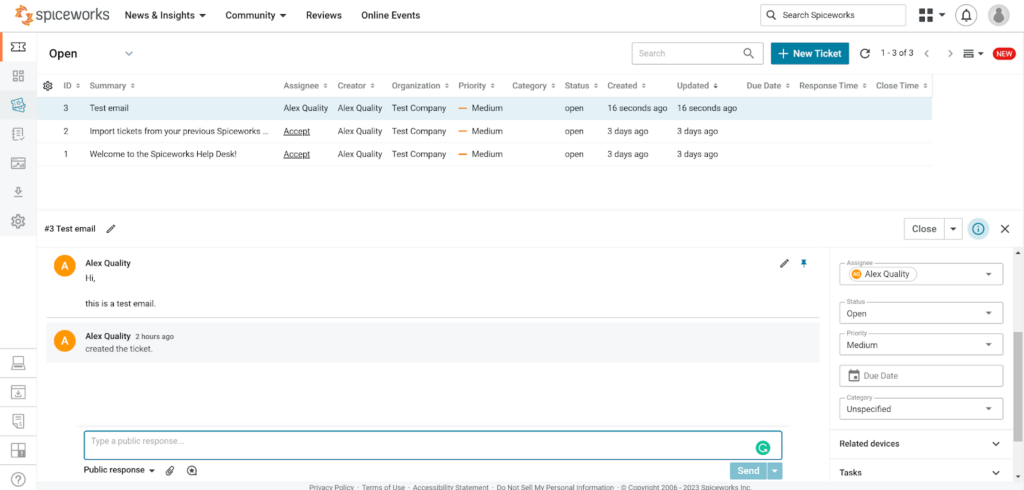
Spiceworks is a free ticketing system that is designed for small businesses. It offers a range of features, including ticket management, team collaboration tools, and automation capabilities.
Utilize Spiceworks Help Desk to incorporate the User Portal, enabling users to effortlessly submit new tickets and track the progress of existing ones without continual communication. The Knowledge Base serves as a repository for frequently asked questions, saving time for both users and support teams.
No need for concern when customer service agents are away from their desks—Spiceworks Help Desk mobile app provides real-time ticket updates and push notifications directly on your phone or tablet.
Key features of Spiceworks
- Customization
- Collaboration
- Self-Service
- Automation
- Remote Support
Pricing
Lowest Paid Plan: Free
Highest Paid Plan: Free
16. Groove
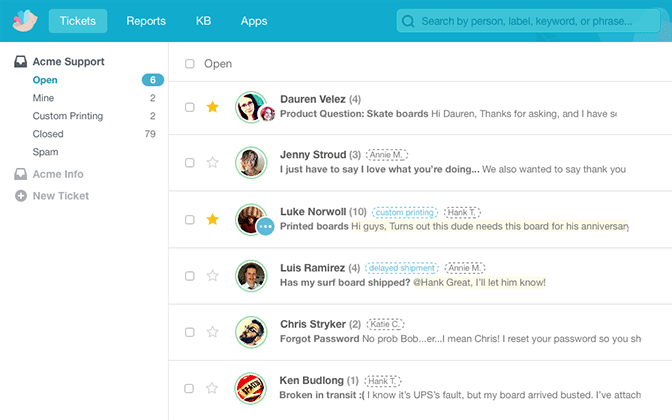
Groove is a simple, yet powerful customer support tool designed for small businesses and teams. It emphasizes ease of use and efficiency, providing essential features to manage customer support without the complexity of larger, more intricate systems.
Key features of Groove
- Shared inbox
- Ticketing system
- Knowledge base
- Multi-channel support
- Collaboration tools
- Automation
- Reporting and analytics
- Integrations
- Customer feedback
Pricing
Groove provides four pricing tiers:
- Starter: Includes one mailbox and live chat at $12 per user per month.
- Plus: Offers five inboxes and complete reporting history for $20 per user per month.
- Pro: Features 25 inboxes and team capabilities at $35 per user per month.
- Custom: Comes with unlimited mailboxes and a dedicated success manager, priced on request.
17. Helpwise
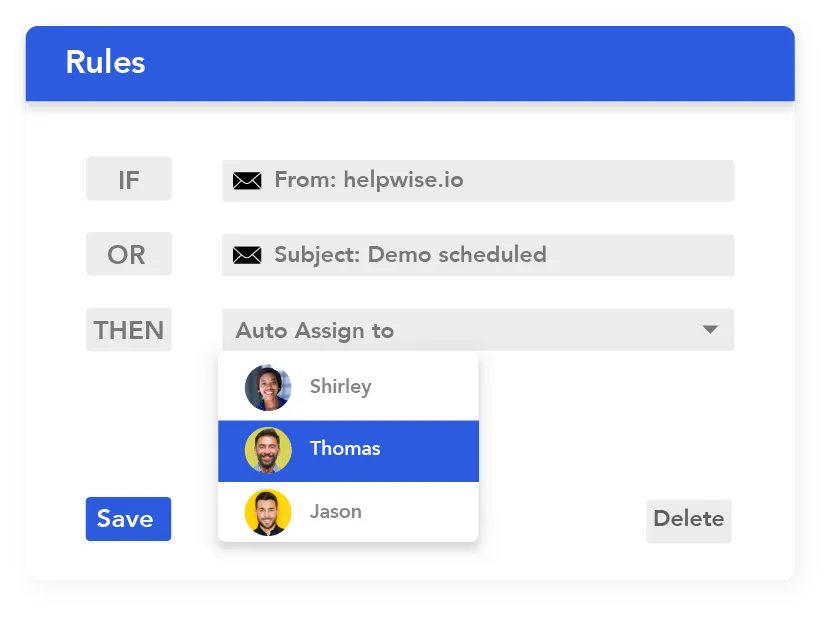
Helpwise is a shared inbox platform designed for team collaboration and efficient management of customer communications. It allows teams to handle emails, SMS, WhatsApp, live chat, and social media messages all in one place, streamlining the process and improving response times.
Key features of Helpwise
- Shared inboxes
- Multi-channel support
- Collaboration tools
- Automation and rules
- Analytics and reporting
- Knowledge base integration
- Customizable tags and categories
- Security features
- Integrations
- Mobile app
Pricing
- Standard: $12/agent/month
- Premium: $23/agent/month
- Advanced: $39/month/ user
How to choose the right helpdesk ticketing system?
Choosing the right ticketing software for your business is crucial for providing efficient and effective customer support. Here are some key factors to consider:
1. Understand your needs
Identify the specific requirements of your business and support team. Consider the volume of tickets, the complexity of support issues, and the channels through which customers reach out.
2. Look for essential features
Ensure the software has core features like ticket management, automation, multi-channel support, and reporting capabilities. These features are fundamental for streamlining your support process.
3. Consider scalability
The software should be able to grow with your business. Look for a solution that can handle an increasing volume of tickets and support additional users as your team expands.
4. Evaluate integration capabilities
The ticketing software should integrate seamlessly with other tools you use, such as CRM systems, live chat, and email platforms. This ensures a cohesive workflow and a unified view of customer interactions.
5. Assess ease of use
The software should be user-friendly for both your support team and your customers. A steep learning curve can hinder productivity and lead to a poor user experience.
6. Check for customization options
The ability to customize the software according to your business needs, such as branding, ticket fields, and workflows, is essential for maintaining consistency and efficiency.
7. Prioritize customer support
Good customer support from the software provider is crucial, especially during the initial setup and for resolving any issues that may arise.
8. Consider budget
Determine your budget and compare pricing plans of different ticketing software. Be mindful of hidden costs and ensure you’re getting value for your investment.
9. Read reviews and testimonials
Look for feedback from other businesses that have used the software. Their experiences can provide valuable insights into the software’s performance and reliability.
10. Take advantage of Free trials
Most ticketing software providers offer free trials. Use this opportunity to test the software in your environment and assess its compatibility with your business needs.
By carefully considering these factors, you can choose the right ticketing software that not only meets your current needs but also supports your business’s growth and evolution in customer support
Choose the best helpdesk ticketing system
In conclusion, choosing the right helpdesk software is crucial for streamlining your customer support operations and ensuring no customer feels overlooked.
With a variety of options available, including free versions with robust features, you can easily find a solution that fits your needs and budget.
As you explore these top picks for 2025, don’t forget to consider Desk365. It’s a comprehensive, cost-effective platform that can help you stay organized, improve efficiency, and deliver exceptional customer service. Give a free trial with Desk365 and see the difference it can make for your team and your customers.

